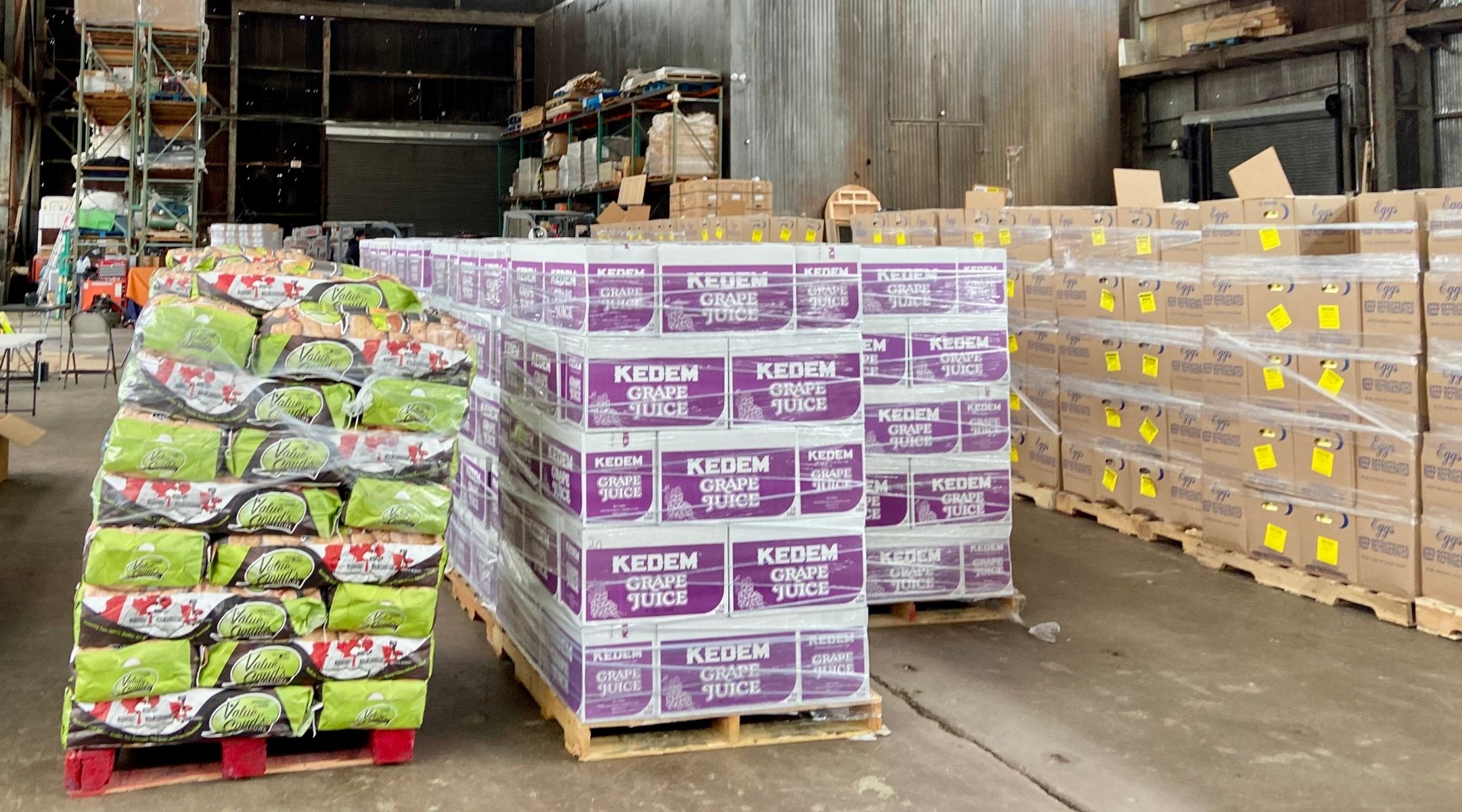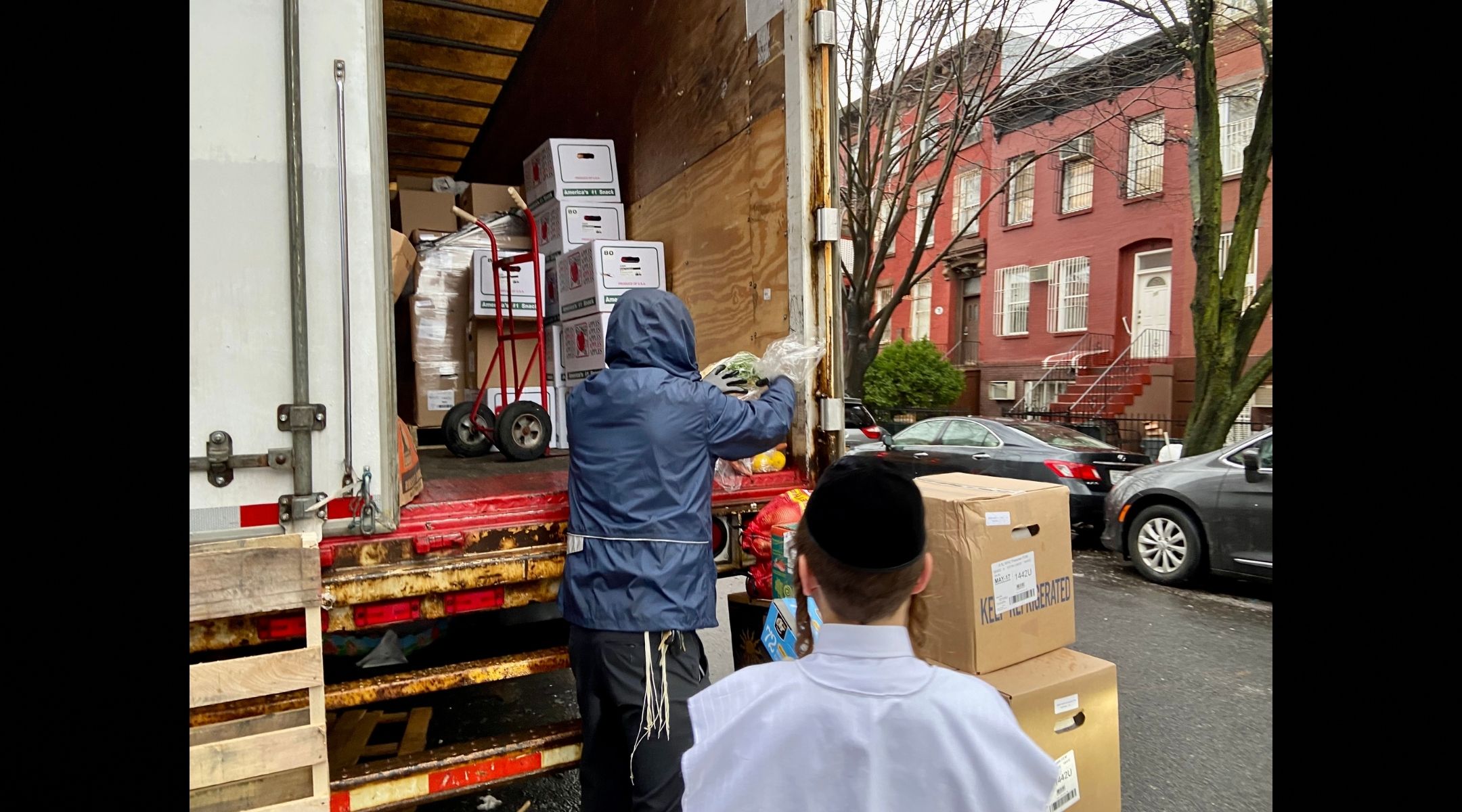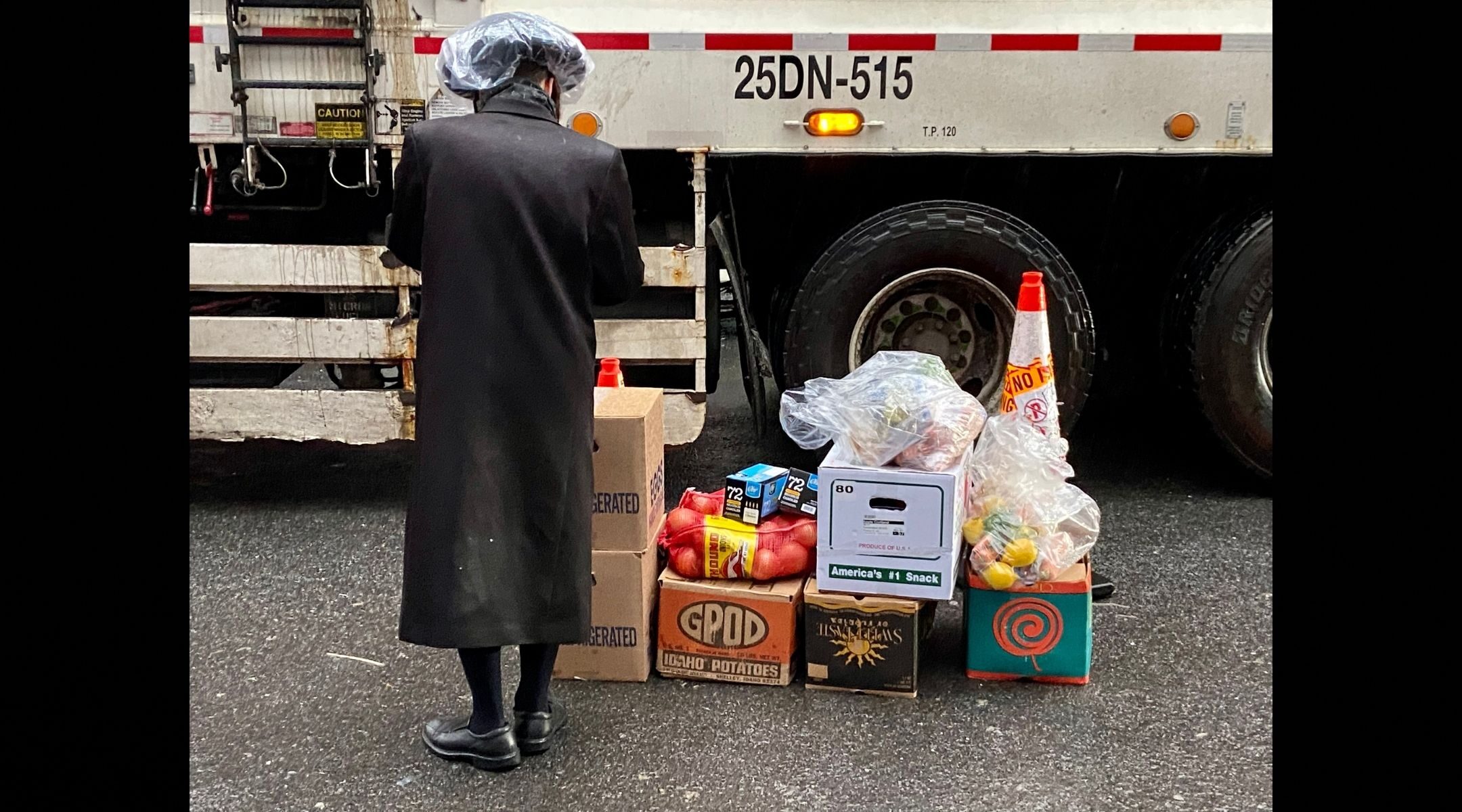(New York Jewish Week) — Two years into the pandemic, many Hasidic families in Williamsburg, Brooklyn are struggling to make ends meet: Lost jobs, rising prices and large families mean the cost of holding a Passover seder can be out of reach for many religious families without charitable help.
One of the largest organizations filling the gap is the Metropolitan Council on Jewish Poverty, which runs a massive warehouse in Flatbush that offers kosher staples. Met Council expects to give out free food to over 300,000 families this Passover season in Brooklyn and beyond.
On Sunday, less than a week before Passover, nearly 3,000 families received holiday staples provided by Met Council and a local organization, the United Jewish Organizations of Williamsburg, at the UJO’s distribution center at the Brooklyn Navy Yard. Thousands of boxes of kosher grape juice, eggs and fresh produce were being offered as cars driven by Orthodox Jews lined up for over a mile.
And yet despite this, a faction within Williamsburg’s Satmar Hasidic community is warning followers not to accept food from the charity. According to a decree that has been circulating in the weeks before Passover, accepting the donated food is forbidden because Met Council and its partner, UJA-Federation of New York, are “Zionist” organizations that “hold all the abominations of the world.”

The inside of the United Jewish Organizations of Williamsburg’s distribution center at the Brooklyn Navy Yard, where thousands of families are given free food for Passover provided by the Metropolitical Council on Jewish Poverty. (Jacob Henry)
“Their intention is to build bridges and to unite the communities of the non-believers and Haredis in New York to presumably push for us to be one nation, heaven forbid,” the decree, signed by 11 rabbis, says in Hebrew (“haredi” is a Hebrew name for strictly Orthodox Jews).
“Therefore, it is certainly forbidden to enjoy money from them,” the decree says. “The keeper of his soul and the soul of his house shall be far from this money.”
The decree has dismayed some members of the Satmar community, which is famously divided into factions led by two different Grand Rabbis. And despite the decree, some observers say, followers of the 11 rabbis who signed the decree continue to accept food from Met Council, while even some of the signers source food from the agency and say it is coming from Satmar philanthropists.
The decree echoes essays in newspapers serving the Satmar community, which allege that Zionist and Reform Jews are infiltrating the Satmar community through Met Council and the federation. One article says funding for these organizations comes from “criminals and infidels,” forbidding anyone to take food from them.
The Satmar are a large and growing Hasidic movement that seeks a separation from the secular world, as well as other Jews who don’t share their strict interpretation of Jewish law and custom. Satmar and many other Hasidic movements do not accept political Zionism, saying the creation of the Jewish state before the coming of the Messiah is a violation of God’s plan. Met Council and UJA-Federation are non-denominational nonprofits that work across the Jewish ideological spectrum.
“We are people that obey the Torah,” said one of the rabbis who signed the decree, and who requested anonymity. “The other people, they do not keep the Torah. We’re at war with them. This is a war between people who believe in God and those who don’t believe in God.”
Such teaching, he said, comes from the founder of the Satmar community, the late Grand Rabbi Joel Teitelbaum.
“Teitelbaum said if you take money from them, if you eat from them, if you accept anything from them, you give them your heart,” the rabbi said. “All the rabbis decided after World War II, even when the population was very poor, that we should take no money from the federation no matter what. For us, it’s not even a question, it’s forbidden.”
And yet even within Satmar there are divides, especially between a faction in Williamsburg and another in Kiryas Joel, a Satmar community in suburban Orange County, New York.
One member of the community in Williamsburg, who requested anonymity because he feared retaliation, said the decree was a product of a far-right Satmar faction in Brooklyn that he compared to “the Talibans,” referring to the extremist Muslim group in Afghanistan.
“Williamsburg is being run by this Taliban group,” he said. “There are a couple rabbis. They give out decrees and everyone has to follow. Anything you do, you risk being kicked out.”
The same community member said that while these rabbis are telling followers not to take food from Met Council and UJA, some of the signers are themselves distributing food being given out by Met Council distribution centers.
“Their own people are getting food from these rabbis at their shuls,” he said. “The people don’t know that the food is from Met Council.”

Volunteers helped distribute food at a Satmar distribution center in Williamsburg, April 10, 2022. (Jacob Henry)
The rabbi who signed the decree and who spoke with the New York Jewish Week confirmed that some rabbis are distributing food that originated with Met Council.
“Maybe some of the rabbis, they forgot about the decrees,” he said. “But it’s only two to three people who do it. No one else knows it’s Met Council food.” He declined to give names, but said he felt pain that this was happening.
“It hurts me,” the rabbi said. “The community doesn’t know about this, and it’s happening at many places. People get food, and they don’t know it’s coming from the federation.”
He also said that when people ask how they received the food, the rabbis just tell them that it’s “charity or tzedakah.”
“They say it comes from fundraising or different stores, but never from Met Council,” the rabbi said.
An Orthodox warehouse worker who volunteers with Met Council said the opponents of Met Council are being “fundamentally dishonest.”
“They are misrepresenting the people for their own sake,” he said. “Even though there are still official decrees about it, in the age of information, there is more knowledge about it. The knowledge will set you free.”
Rabbi David Niederman, executive director of the United Jewish Organizations of Williamsburg, who often speaks for Satmar interests, said few people are listening to the decrees.
“The lines of the people standing out there means that they saw the pamphlet and couldn’t care less,” Niederman said. “They can send it out. We don’t have the time to speculate what some person in their bunker decides to put out.”
He denied, however, that rabbis are giving out Met Council food and passing it off as their own, calling it “untrue.”
Met Council CEO David Greenfield said that he is used to these decrees, which come out every year. This hasn’t stopped the organization from partnering with major Satmar groups in Williamsburg such as UJO.
“These are just fringe groups,” Greenfield said of the opponents. “I’m being very blunt, but they don’t like us because we support Israel. They are widely discredited and shouldn’t be taken seriously.”
Greenfield said that he does know about allegations that rabbis who signed the decrees are still taking Met Council food.
“We know that these communities are getting food,” he said. “And if some folks want to play a game where they’re slapping us with one hand and then taking food with the other hand, I’m okay with that. The last thing I would want is for people in the community to suffer because of a handful of radicals.”
He added that the highest level of charity is helping people without receiving credit.
“As long as the people who need the food are getting food, it doesn’t matter to me how they get it,” Greenfield said.
When asked about how the community would be able to feed its people without Met Council, the rabbi on the decree said “they would manage.”
“The rabbi told us 50 years ago to live like this, and we’re still doing it today,” he said. All these other people, they’re against our belief.”
Chaim Levin contributed to this report.
The New York Jewish Week brings you the stories behind the headlines, keeping you connected to Jewish life in New York. Help sustain the reporting you trust by donating today.





